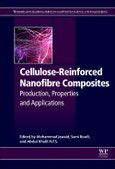Cellulose-Reinforced Nanofibre Composites: Production, Properties and Applications presents recent developments in, and applications of, nanocellulose as reinforcement in composite and nanocomposite materials.
Written by leading experts, the book covers properties and applications of nanocellulose, including the production of nanocellulose from different biomass resources, the usefulness of nanocellulose as a reinforcement for polymer and paper, and major challenges for successful scale-up production in the future. The chapters draw on cutting-edge research on the use of nanosized cellulose reinforcements in polymer composites that result in advanced material characteristics and significant enhancements in physical, mechanical and thermal properties.
The book presents an up-to-date review of the major innovations in the field of nanocellulose and provides a reference material for future research in biomass based composite materials, which is timely due to the sustainable, recyclable and eco-friendly demand for highly innovative materials made from biomass.
This book is an ideal source of information for scientific and industrial researchers working in materials science.
Please Note: This is an On Demand product, delivery may take up to 11 working days after payment has been received.
Table of Contents
1. Nanofibrillar Cellulose in Thermoset Polymer Composite 2. Hybrid Montmorillonite/Cellulose Nanowhiskers Reinforced Polylactic Acid Nanocomposites: A Comparative Study Based on Formulation Design 3. Bionanomaterials from agricultural wastes and their applications 4. Recent advances in cellulosic nanocomposites 5. Challenges in Design of Nanocellulose and its composites for different applications 6. Nanofibrillar Cellulose from agricultural biomass residues 7. Nanofibrillated cellulose as strength additive for paper 8. Nanocellulose in Functional Packaging 9. Application of Nanocrystalline cellulose: processing and applications in biomedical 10. Nanowhiskers from oil palm biomass 11. Cellulose nanocrystals: preparation Methods and applications 12. Nanocellulose as new adsorbent for environmental remediation 13. Nanofibrillar Cellulose in Nanocomposites 14. Bacterial cellulose: Preparation and Characterization 15. Preparation of Bionanocomposites and bionanomaterials from agricultural wastes 16. Cellulose nanocrystals-based nanocomposites 17. Green nanocomposites from cellulose nanowhiskers and Jathropa oil-based polyurethane 18. Key issues in reinforcement involving nanocellulose 19. Nanocellulose as a template for the production of advanced nanostructured material 20. Cellulose Nanomaterials as Additives for Cementitious Materials 21. Cellulose Nanocomposites: Opportunities and Challenges








